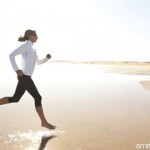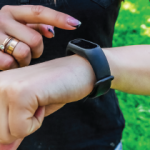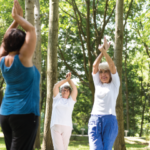The authors write, “The general slope for the [pedometer-plus-step-guidance] group was positive, averaging an increase of about 22 steps per week (P=0.27), whereas the slope was negative for the [pedometer-only] group, averaging a decline of about 37 steps per week (P=0.08).” This difference may be the result of a large increase in steps from baseline for the pedometer-only intervention group. The authors note, “The more gradual increase of the [pedometer-plus-step-guidance] group, guided by targets, may have led to greater adherence over time. It is also possible that the larger initial increase in the [pedometer-only] group led to higher levels of fatigue or symptoms that discouraged continued increases in activity.”
Additionally in their discussion, the authors note that they did not find clear evidence that incremental targets are more effective in increasing step counts than providing only a pedometer. They call for more research into how best to determine the most effective means of delivering the intervention and to identify individuals who may need the additional support or motivation of targets.
Fatigue: Mean changes in PROMIS fatigue scores from baseline to Week 21 were -1.6, -3.2 and -4.8 for the control, pedometer-only and pedometer-plus-step-guidance groups, respectively. “Although overall changes in fatigue scores were not significantly different between groups, both intervention groups significantly decreased fatigue levels, … with over 50% reporting clinically important decreases in fatigue,” write the authors.
Secondary outcomes: Researchers also found that function, pain and self-reported disease activity also improved in both intervention groups. Depressive symptoms were assessed with the eight-item version of the Patient Health Questionnaire and significantly decreased in the intervention groups, confirming that physical activity has a positive effect on depression in RA patients.
Katz P, Margaretten M, Gregorich S, et al. Physical activity to reduce fatigue in rheumatoid arthritis: A randomized controlled trial. Arthritis Care Res (Hoboken). 2018 Jan;70(01):1–10.



